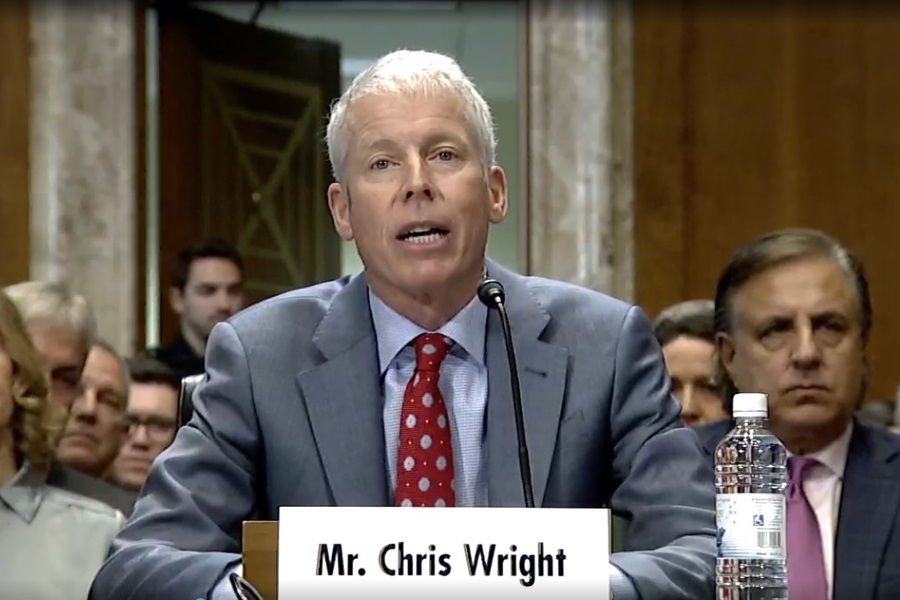
Liberty Energy's Chris Wright is President-elect Donald Trump’s nominee to head the Department of Energy. (Source: Hart Energy Archives)
Secretary of Energy nominee Chris Wright testified on the need for the U.S. to strengthen its electrical grid and take an “across the board” approach to energy development during his Jan. 15 appearance at the Senate Committee on Energy and Natural Resources.
Calling himself a “science geek turned tech nerd,” Wright, the CEO of Liberty Energy, laid out his priorities as the potential head of the U.S. Department of Energy.

“America has a historic opportunity to secure our energy systems, deliver leadership in scientific and technological innovation, steward our weapons stockpiles and meet Cold War legacy waste commitments,” Wright said in his opening statement.
“President (Donald) Trump shares my passion for energy, and if confirmed, I will work tirelessly to implement his bold agenda as an unabashed steward for all sources of affordable, reliable and secure American energy.”
Wright laid out three priorities: expanding energy production, boosting the nation’s national lab system to encourage innovation and removing bureaucratic barriers to energy project construction.
“Federal policies today make it too easy to stop projects and very hard to start and complete projects,” Wright said.
The nominee discussed how national governmental policy has placed barriers in front of the continued development of the U.S. power supply, and the policies are having a deleterious effect.
“We've had roughly a 100-year history in the United States of making electricity more affordable, on inflation-adjusted terms and our grid more reliable,” he said. “We've seen that trend reverse in the last few years. We've seen electricity prices go up, and the reliability of the grid go down and both of us [Wright and Trump] are very concerned about that.”
The last couple of days have seen contentious moments, as the nominees of the incoming Donald Trump administration clashed with Democratic Senators during testimony. In comparison, Wright’s hearing was far less combative.
It helped that the nominee is a friend of Sen. John Hickenlooper (D-Colo.) and that the ranking opposition member of the committee is Sen. Martin Heinrich (D-N.M.), who represents the state home to the growing Delaware Basin.
Wright did not face a hostile question until about 40 minutes into the hearing, when Sen. Catherine Cortez Masto (D-Nev.) grilled him about the status of the Yucca Mountain project, a proposed national nuclear waste dump site in Nevada that Sen. Harry Reid killed before he retired.
Masto asked Wright if the project would remain unfinished, Wright said nothing would happen without the local support of Nevadans.
Sen. Alex Padilla (D-Calif.) had one of the more contentious moments in the hearing, when he said he was disappointed over an earlier social media post Wright made on wildfires. In 2023, the nominee posted that “hype” over wildfires was just hype to “justify more impoverishment and bad government policies.”
“Given the devastation that we're currently experiencing in Los Angeles, do you still believe that wildfires are just hype?” Padilla asked.
Wright said the situation in Los Angeles is tragic but that he stood by his comments.
Protesters interrupted the hearing four times, usually by shouting about the wildfires and linking them to global warming.
An environmentalist group released a statement opposing Wright as he testified.
“Donald Trump’s pick to run the Energy Department makes clear that the new administration will be in the pocket of the fossil fuel donors,” David Arkush, director of Public Citizen’s Climate Program said. “Chris Wright has been an evangelist for drilling more and exporting more U.S.-produced fossil fuels overseas.”
Republican committee members all announced their support for the nominee and used their question and answer time to discuss improving the electric grid, strengthening the national lab system or potential energy projects in their home states.
Sen. Dave McCormick (R-Penn.) discussed the potential of an LNG export terminal in the Keystone State.
During the hearing, Wright emphasized several times the importance of energy development as a means to alleviate poverty.
“My whole thing is we want more energy in the world because it's what makes people's lives better,” he said. “You have to understand that there isn't dirty energy and clean energy. All energies are different, and they all have different trade-offs.”
Recommended Reading
E&P Highlights: Feb. 24, 2025
2025-02-24 - Here’s a roundup of the latest E&P headlines, from a sale of assets in the Gulf of Mexico to new production in the Bohai Sea.
Trump Says He Will Double Tariffs on Canadian Metals to 50%
2025-03-11 - President Trump said he would double his tariffs on Canadian steel and aluminum products in response to Ontario placing a 25% tariff on electricity supplied to the U.S.
Enchanted Rock’s Microgrids Pull Double Duty with Both Backup, Grid Support
2025-02-21 - Enchanted Rock’s natural gas-fired generators can start up with just a few seconds of notice to easily provide support for a stressed ERCOT grid.
E&P Highlights: April 7, 2025
2025-04-07 - Here’s a roundup of the latest E&P headlines, from BP’s startup of gas production in Trinidad and Tobago to a report on methane intensity in the Permian Basin.
US Drillers Cut Oil, Gas Rigs for First Time in Three Weeks
2025-03-28 - The oil and gas rig count fell by one to 592 in the week to March 28.
Comments
Add new comment
This conversation is moderated according to Hart Energy community rules. Please read the rules before joining the discussion. If you’re experiencing any technical problems, please contact our customer care team.




